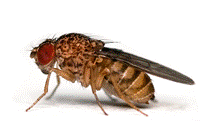Papers in the Biological Sciences

Lawrence G. Harshman Publications
Document Type
Article
Date of this Version
2005
Citation
Journal of Insect Physiology 51 (2005), pp. 455–464; doi:10.1016/j.jinsphys.2004.12.013
Abstract
It has been suggested that insulin signaling mutations of Drosophila melanogaster are sterile and long-lived because of juvenile hormone (JH) and ecdysteroid deficiency. However, female sterility of an insulin/IGF-like signaling mutant (chico1) of D. melanogaster is not mediated by downstream systemic signaling in terms of major alterations in JH or ecdysteroid levels. chico1 is a null mutation in the insulin substrate protein (CHICO) gene of D. melanogaster. Homozygous chico1 females are sterile and their oocytes do not mature beyond the last previtellogenic stage. Homozygous chico1 females exhibit approximately wild-type rates of JH biosynthesis, ovarian release of ecdysteroids and haemolymph ecdysteroid levels, suggesting that these two major hormone systems play no role in producing the sterility. Previtellogenic wild-type ovaries transplanted into homozygous chico1 females underwent vitellogenesis, showing that systemic factors present in mutant females are sufficient to support nor-mal vitellogenesis. chico1 ovaries transplanted into wild-type females did not undergo vitellogenesis indicating that CHICO is necessary in the ovary for vitellogenic maturation. The ovary transplant experiments corroborate the endocrine results and demonstrate that insulin/insulin-like signaling (IIS) is necessary for vitellogenesis even when sufficient levels of JH, ecdysteroids or other factors are present.


Comments
© 2005 Elsevier Ltd. Used by permission.